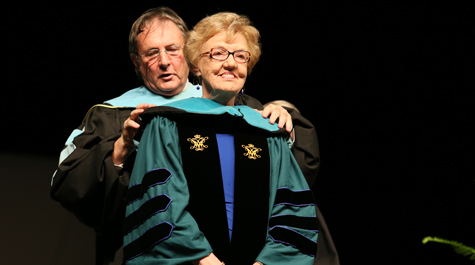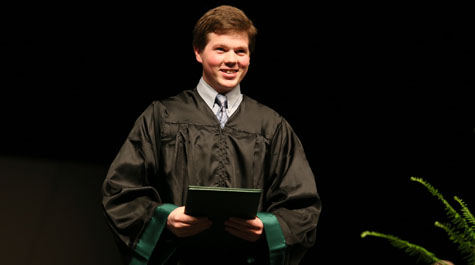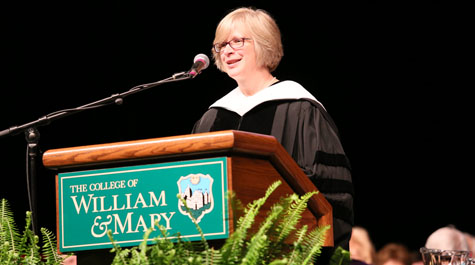Gates lauds the value of higher education at Charter Day
Higher education is a public good that should be supported by the government for the benefit of society as a whole, said former Secretary of Defense Robert M. Gates '65, L.H.D. '98 at William & Mary’s Charter Day ceremony on Feb. 8.
“We will all pay the price for short-changing education, research and other investments in the future,” said Gates, who also serves as the university’s 24th Chancellor. “It will be felt in the decline of America’s quality of life, standards of living and global influence.”
Gates received a standing ovation from the approximately 3,500 who gathered in William & Mary Hall to celebrate the 320th anniversary of the university’s royal charter. The annual event has become a birthday celebration for the university and a chance for the institution to recognize the outstanding contributions of faculty, alumni and students.
‘A public good’
The university’s chancellor, who talked during last year’s event about the importance of fighting partisanship, focused on the value of higher education in this year’s speech, condemning the government’s increasing lack of support for it.
{{youtube:medium:left|iriV_40JOk8, Chancellor Robert M. Gates' 2013 Charter Day address}}
Gates, who once served as the president of Texas A&M University, noted that higher education was once seen as a public good.
“Making a college education available to citizens at every socio-economic level was seen broadly as a worthwhile investment in the economic and social future of our individual states and of the country as a whole,” he said.
However, now it seems that politicians who take that view of higher education “are in our rear-view mirror,” said Gates.
“In recent years, we have seen a gradual abandonment of the principle that higher education is a public good and, correspondingly, the emergence of a view that higher education is a private consumer good of value only to the individual receiving it,” he said.
As government support declines, the government’s desire for control over public universities seems to increase, said Gates.
“If public colleges and universities don’t reform themselves to contain costs, improve access and increase graduation rates, federal and state governments will step in,” he said. “That can only be bad news because, like the dinosaur, government has a heavy foot, a small brain and no fine motor skills.”
As William & Mary marked its 320th birthday, Gates asked where the visionary leaders of yesterday had gone.
“Visionary leaders who understand that higher education is the engine driving America to a better future for all its citizens – not a consumer good, but a public investment – and a public good,” he said. “The single most important driver of opportunity and prosperity at home, and for American influence and idealism abroad.”
But there is hope yet, said Gates, and William & Mary – as it has many times in the past – can play a part.
“As we confront that question, as I said last year, in the great and urgent endeavors that lie before us, I have no doubt that the graduates and scholars of William & Mary – this community of learning, listening and working through issues – rooted in the original soil and the basic principles of American liberty have a special role, and a special obligation, to be part of the solution.”
Celebrating success
During the ceremony, several members of the William & Mary community were recognized for their work and contributions to the university.
Lois Critchfield, a longtime friend of William & Mary and former CIA employee, received the honorary degree of doctor of public service. Critchfield has worked closely over the years with students and faculty at the Reves Center, creating the James H. Critchfield Memorial Endowment for Middle East Studies and the Critchfield Conference in Middle Eastern Studies.
Additionally, the annual Thomas Jefferson Awards were presented. Dean for Educational Policy Teresa Longo received the Thomas Jefferson Award, and Hylton Associate Professor of Government and International Relations Michael Tierney ‘87 received the Thomas Jefferson Teaching Award. Brian Rabe ’13 was presented the Thomas Jefferson Prize in Natural Philosophy, and Taylor Nelson ‘13 was recognized for her community engagement work with the James Monroe Prize for Civic Leadership.
{{youtube:medium:left|U0U1GU95eQM, Ebony Expressions performs}}
At the beginning of the event, students from across the campus read the royal charter. A video clip of former Provost Gill Cell, who passed away in September 2012, concluded the reading. Dylan Frendt ’14 offered his reflections on the charter, a new tradition that began last year.
The William & Mary Choir provided music, and the Ebony Expressions Gospel Choir closed the ceremony with their rendition of “Happy Birthday.”
The highlight of 1693
In his closing remarks, William & Mary President Taylor Reveley noted that he had looked through the history of 1693 to “see what else happened the year the College was born.”
“Turns out pickings weren’t all that frisky. There was Louis XIV’s attack on Heidelberg, the French fleet’s defeat of the Dutch and English at the Battle of Lagos and the eruption – yet again – of Mount Etna,” he said. “Cleary William & Mary’s birth was the hit of the year.”
{{youtube:medium:left|vZYEWDdfqaM, President Taylor Reveley's closing remarks}}
Although things like mountains are expected to last, human institutions are more likely to “be gone with the wind,” said Reveley, adding that William & Mary could have easily gone that way.
“What remains for William & Mary after 320 years is the dignity and poise, the self-confidence and staying power, the pervasive excellence that comes from rising above life’s outrageous slings and arrows. This magnificent institution, full of life’s promise, marches on to even greater heights.
“In sum, William & Mary came early and will stay late. Of that, I have no doubt.”























